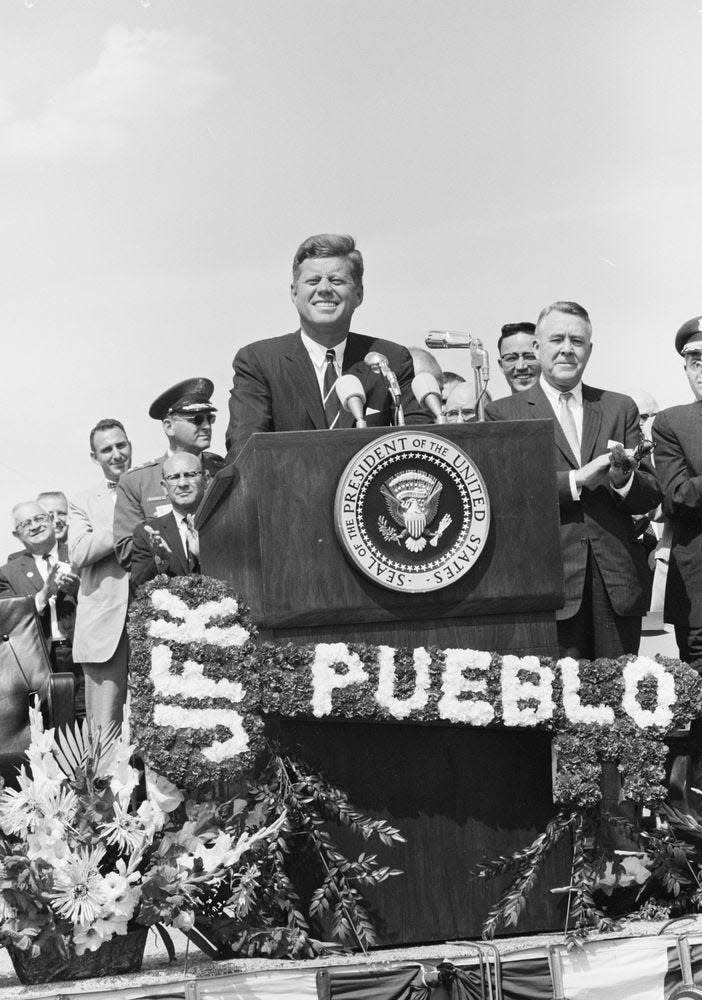Local leaders and U.S. senators celebrate $60 million for Arkansas Valley Conduit
![[CHIEFTAIN FILE PHOTO] The lower Arkansas River as seen from the North Swink Bridge. The Arkansas Valley Conduit was approved for funding in 1962, and will finally be receiving funds.](https://s.yimg.com/ny/api/res/1.2/EsQR8D1XnhskPa_EYFcshQ--/YXBwaWQ9aGlnaGxhbmRlcjt3PTEyNDI7aD02MDc-/https://media.zenfs.com/en/the-pueblo-chieftain/17c41f30aa8738a58ba13ef6d088fd09)
- Oops!Something went wrong.Please try again later.
- Oops!Something went wrong.Please try again later.
Just over 25% of people living in Pueblo County today were alive when the Arkansas Valley Conduit was first announced by President John Kennedy in Pueblo in 1962.
"I don’t think there is any more valuable lesson for a president or member of the House and Senate than to fly as we have flown today over some of the bleakest land in the United States and then to come to a river and see what grows next to it, and come to this city and come to this town and come to this platform and know how vitally important water is,” Kennedy said during his speech.
Sixty years later, substantial federal money is flowing into the project that will supply clean drinking water from Pueblo Reservoir to dozens of Eastern Plains communities along the Arkansas River.
On Thursday, county commissioners from the region, water officials and both of Colorado's U.S. senators gathered at the headquarters of the Southeastern Colorado Water Conservancy District to commemorate the new funding for the project.
The $60 million federal allocation from the Bipartisan Infrastructure Package represents approximately 10% of the total estimated cost of the project.
Sen. Michael Bennet, a Democrat up for re-election in November, said the newly injected funds bring the total contribution from D.C. to the project up to $140 million.
Members of Colorado’s delegation at the U.S. Capitol from both sides of the aisle have been pushing for more federal funding for the project for years, including former Sen. Cory Gardner, a Republican.
Pueblo County allocated millions of federal COVID-19-related ARPA grant money earlier this year to portions of the conduit reaching some of the eastern communities of Pueblo County, such as Avondale and Boone.
In October, a $42.9 million contract was awarded to WCA Construction LLC, a construction company owned by the Ute Mountain Ute Tribe based in southwest Colorado.
Sen. John Hickenlooper said Thursday he hopes the project can be completed within the next five years, but more federal funding will be needed to make that timeline realistic.
Once the project starts gaining momentum, funding from local and federal sources, including loans, will be easier to secure, said Chris Woodka, the senior policy and issues manager at the Southeastern Colorado Water Conservancy District.
Some of the drinking water available to Eastern Plains communities is not of the highest quality. Much of the water is sourced from an aquifer thousands of feet below the Earth’s surface that is contaminated with naturally occurring radionuclides. High levels of exposure to these radioactive particles can cause adverse health effects.
Pueblo Reservoir was developed as a water storage area under the broader Frying Pan-Arkansas Project. The Arkansas Valley Conduit is the only part of the broader Frying Pan-Arkansas Project that has not yet been completed.
The reservoir will have ample water to send to the towns along the Arkansas River, according to studies that have been done, Woodka said.
Bennet said the infrastructure legislation is emblematic of a bipartisan spirit to help Americans.
“This is the first time since Eisenhower was president that we have actually invested in the infrastructure of the United States of America,” Bennet said, giving credit to all of the people who have worked on the conduit project over the decades.
“That’s the way America is supposed to work, that’s the way Colorado is supposed to work,” Bennet said.

Hickenlooper was heavily involved with negotiations for the legislation that was signed into law in November 2021. Many Senate Republicans supported the bill, but most House Republicans, including the three Republicans from Colorado, voted against it.
“I think that for a long time, we were getting the short end of the stick again and again when they began divvying up infrastructure projects around the country,” Hickenlooper said. "Colorado’s history is written in water.”
The city of Pueblo is also receiving nearly $17 million from the same bill for three projects to increase transportation connectivity and access on the West Side.
City of Pueblo seeks to improve West Side transportation with new grant funds
Anna Lynn Winfrey covers politics for the Pueblo Chieftain. She can be reached at awinfrey@gannett.com or on Twitter, @annalynnfrey.
This article originally appeared on The Pueblo Chieftain: Arkansas Valley Conduit funding prompts celebration for water project

